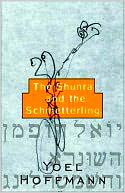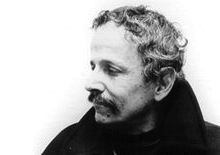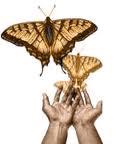“I give my father’s father the cat. My father’s father releases white butterflies into the space of the home, and the old cat chases them as though in a slow-motion movie. But when a butterfly rises in the air, my grandfather performs an act like that of the one who was crucified, and in his hand he lifts the cat toward the sky of the room, which is fashioned in the form of a ceiling.”
Lively images of the cat (shunra) and the butterfly (schmetterling) chase and play through the memories of a poetic child as Yoel Hoffmann, one of Israel’s most celebrated writers, takes us to another time and place and recreates childhood and the coming of age through poetry. More than sixty years have passed since the speaker first lived in Ramat Gan, and the passage of time has intensified some memories, eliminated the irrelevancies from others, and connected the fantasies of childhood with the perennial mysteries of adulthood.
As he begins t o recall images from his life, the veranda on which his father’s father sat rises from memory, “like that legendary bird rising from its ashes…The veranda of the world itself—whose heart is an electric lightbulb.” From this veranda his grandfather “sent out his hand like Napoleon” and in a voice “which exists on the right side of creation entirely,” pointed across old battlefields to distant villages, saying, “There is the land of the Arabs.” The veranda, seen in larger terms, becomes symbolic of the grandfather’s experience, the experiences of the family, and the history of the Jewish people. “How,” he asks, “does one draw a veranda after two thousand years of exile? A broken railing. Grillwork like Auschwitz. A floor laid with the tiles of pogroms, and the Nuremberg laws in the wall’s plaster…”
o recall images from his life, the veranda on which his father’s father sat rises from memory, “like that legendary bird rising from its ashes…The veranda of the world itself—whose heart is an electric lightbulb.” From this veranda his grandfather “sent out his hand like Napoleon” and in a voice “which exists on the right side of creation entirely,” pointed across old battlefields to distant villages, saying, “There is the land of the Arabs.” The veranda, seen in larger terms, becomes symbolic of the grandfather’s experience, the experiences of the family, and the history of the Jewish people. “How,” he asks, “does one draw a veranda after two thousand years of exile? A broken railing. Grillwork like Auschwitz. A floor laid with the tiles of pogroms, and the Nuremberg laws in the wall’s plaster…”
Yet this “memoir” is not a manifesto or catalogue of wrongs. Rather it is the vivid and poetic recreation of one boy’s life, the people he remembers from a seemingly ordinary Israeli village, and his discoveries about dreams and the passage of time. The speaker spends a great deal of time with his grandfather, and the reader recognizes the remarkable bond between them. In the image of the grandfather releasing butterflies, and then lifting his cat “toward the sky of the room” to bat at them, the reader also sees the grandfather as a loving mentor, and the boy as the cat, lifted by him to follow his dreams, though he may never catch them. “Butterflies [stand] at the edge of the eye” throughout this memoir, even when “the warning sirens (there were wars then) completed themselves like circles…”

Impressions from past and present flow through the speaker’s consciousness, unfiltered, with one idea reminding him of another from another place and time. Gradually, the reader discovers through the images and symbols that the speaker’s wife is named Nicola and that he himself once grew cannabis in his mother’s cemetery, that his father worked for an insurance company, and his uncle Ladislas was a doctor who was given a donkey, not a car, in order to serve his patients. We meet Mrs. Yoel, who hid raspberry syrup and drank it surreptitiously, and learn about his teacher, Aharon White-Sheep, who has an inflamed ear. We experience his early loves, his school days, his home life with stepmother Mathilda, and his daily life with friends, some of whom have come from different countries and speak a variety of languages. Words in Aramaic, Hebrew, German, Yiddish, and even Icelandic are sprinkled throughout the text and we see them as part of the speaker’s memory and the collective memory of his village and country, a country which has grown because of its immigrants. “Imagine, for a moment,” he says, “a life in which I am on deck calling out Albert, Albert, because Albert is passing by—for this after all is the meaning of civilization: this movement of people from place to place, opticians among them as well.”
Throughout this ultimatel y hopeful work, “A butterfly big as a volume of Talmud [stands] above our heads,” though the author reminds us that the adults in Ramat Gan have had more difficult lives. Mrs. Yoel lived in Hamburg during the 1930s, Lermontov lost his wife in the bombardment of Italy, the grocer Tsehayek “wandered like the cranes of Baghdad” to Israel, and refugees have arrived from Hungary, Germany, and Iraq. And when it is time for the speaker finally to serve in the army and go to war, his father takes him aside. “In a little while,” he says, “you will go to another place, and it’s good you should know that your mother loved you. This love…is like a white towel.” The war in which he fights is like “the movements of a great fish,” and leaves many dead. But now that he is old, his memories still return to thoughts of love, albeit memories tainted by “sounds of shots at [a] movie theater.”
y hopeful work, “A butterfly big as a volume of Talmud [stands] above our heads,” though the author reminds us that the adults in Ramat Gan have had more difficult lives. Mrs. Yoel lived in Hamburg during the 1930s, Lermontov lost his wife in the bombardment of Italy, the grocer Tsehayek “wandered like the cranes of Baghdad” to Israel, and refugees have arrived from Hungary, Germany, and Iraq. And when it is time for the speaker finally to serve in the army and go to war, his father takes him aside. “In a little while,” he says, “you will go to another place, and it’s good you should know that your mother loved you. This love…is like a white towel.” The war in which he fights is like “the movements of a great fish,” and leaves many dead. But now that he is old, his memories still return to thoughts of love, albeit memories tainted by “sounds of shots at [a] movie theater.”
Nature imagery—of birds, animals, clouds, and the sky—permeate this expressionistic painting of a poet’s life, giving depth and color to instants in time and to moments in history. As intense, compressed and sometimes elusive as the speaker’s memories are, the story—and our picture of the author—gradually emerge, insinuating themselves into our own consciousness and speaking directly to us. The effect is unforgettable, a powerful communication between author and reader, transcending time and place.
ALSO by Hoffmann: MOODS
Photos, in order: The author’s photo is from his Wiki page: http://ro.wikipedia.org
The photo of hands releasing butterflies, as the speaker’s grandfather did, appears on http://www.memorialbutterfly.com
